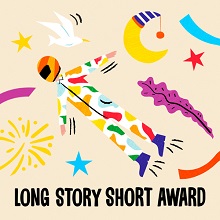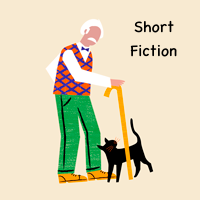I am on a roller coaster which is click clacking up a steep incline. Lily, my eight-year-old granddaughter, is sitting next to me. "This is boring," she laments, gazing languidly over the side of ... [+]
I tripped getting off the train. I’d been so caught up in keeping my star against my chest that I misjudged the gap between the platform and the train, and my foot caught. I had always been a rather clumsy person. I felt the star fall from my hands, slip away as easily as a vase does. Not a vase—a bird: something that we finally have hold of and it gives us unspeakable joy, and when we loosen our hands just a little—never intentionally—it’s gone.
The star didn’t make a noise. I didn’t know if it landed beneath me or rolled or bounced away, or if stars simply returned to the sky when you let go of them. I landed on my hands and knees, palms stinging, ashamed of my carelessness and the palpable gaze of the unseen crowd. I heard a shout and a scuffling sound, the noise of feet stamping, and then a man’s voice said, “It’s all right; it’s out.”
Someone helped me to my feet. My chest felt cold. “It’s out?” I asked. “Did my star go out?”
“Hmm? I thought it was a candle. It was bright.”
Bright. My star had been bright. Bright enough that someone thought it was a candle that needed to be stamped out, before the whole world burned. I had never questioned whether it really was a star or not. Aunt Naomi had said it was a star. It had fluttered in my hands. It warmed me to the core. Surely only stars could feel like that.
And I had dropped it, the prize of the heavens, the tender gift placed lovingly in my unexpectant hands. Stupid. What would I tell Aunt Naomi? Had she expected me to be able to hold onto it? I hadn’t just dropped it. I’d let someone put out its light.
My throat stung. It was hard to breathe. I tried not to let my face show any expression. A tear slipped down from the corner of my eye and past my nose. I didn’t wipe it away because someone was still holding my arm.
“Oh,” said the man’s voice again. “Oh. I’m sorry.”
I said nothing. I pulled my arm out of the bystander’s grasp and began to pick my way out of the station. I could see vague movements of crowded shadows where people waited for their trains. If my star had been so bright, why hadn’t I caught even a glimpse of it? If I hadn’t dropped it, I would have taken it home and set it on the side table next to my bed, and the entire night would have been warm and full of light. Would I have seen it then, against the backdrop of absolute darkness? Would I have made out its shape, its color? Would it have gone out eventually, dimming gradually like a glowstick or flame, or does the magic of stars lie in their unending light?
I felt the cold air on my face and knew I was finally outside. Little pricks of ice graced my face. It was snowing. It was not far from the train station to my apartment, but I didn’t want to go home. I wanted my star. I felt another tear on my cheek—warm and then cold, because of the weather—and sniffled. My legs gave out. I sat down on what I thought was a bench but might have just been a concrete ledge beside the building. I shivered and let myself cry a little more, even though it made my face colder. I didn’t care anymore if people were watching me. I missed the warmth of my star.
People poured out of the station. I could hear their voices, the crunch of their shoes on the stairs, the flood of air gushing out the station doors, the rumble of traffic. A child ran onto the sidewalk and shouted, “Look at the snow! It looks like stars!”
Cold stars, raining down around me. I imagined the little girl’s face, lit up with joy, her hands thrown into the air to welcome the flakes. She must wonder what stars felt like, if they were warm or cold and if they were as small as snowflakes or bigger. I wanted to tell her. I wanted to be able to share my star, if I had it still. I pictured the dark sky lit by snow, but all I kept thinking about was my star and how warm it had been. It must have lit up the entire train. I knew that now. Everyone must have been staring at me, jealous of the light, seeing my face bright and happy.
My phone buzzed. I thought it was a spasm of shivers at first, that I’d been sitting outside for too long, but then I heard it was Aunt Naomi calling and tapped to answer it.
“I lost your star,” I told her, and now the tears came properly, in great, gunky sobs that I couldn’t stop, even when I bit first my lip and then the fleshy part of my palm just beneath the thumb. I couldn’t breathe.
“Stop crying,” Aunt Naomi scolded.
“I’m sorry. You just barely gave it to me, and I’ve already lost it. I dropped it in the train station and it went out. You shouldn’t have given it to me. I’m a klutz. You know I’m not careful enough for a star.”
“Stop crying. Where are you now? Are you at your apartment? Where? You don’t need that star.”
“I’m sorry. I was so stupid.”
I heard her hang up, and that hurt more than if she’d voiced her disappointment. That set me crying again. Someone shook my shoulder. More than one person. I brushed them away. After a long while, I heard my name being called out of the darkness.
“Stop crying,” Aunt Naomi said again. “I told you, you don’t need that star.”
“I dropped it.”
She hauled me to my feet and down the sidewalk towards home. My furnace was off and it was a little cold inside and smelled faintly of dust and the bowl of apples I’d left sitting on the counter. She set me down at the kitchen table.
“If that star could be dropped and go out, it wasn’t good enough for you. Feel this.” Something like rough, knotted string was rubbed against my fingertips. “Do you feel it? It’s thread, child. Not ordinary thread. This one is silver and shines like a city at midnight. I made it from moonlight and daydreams. I wove it into a great, big net. Do you hear me? We’ll catch you another star. A better one.”
My fingers found the edge of the material. “I think it’s just a fishing net.”
“No. Here’s the window.” She pulled me to my feet again and guided me to the sill. “Go on. Throw it.”
I threw the net out into the darkness, feeling foolish; it snagged on what I thought was a tree.
“Did I catch one?” I asked.
“Hundreds,” Aunt Naomi said. “Thousands. You hold the sky now. You are the stars. The weaving is you. You, this silver thread; you, this harmony and strength of knots unbreakable. Child, this vast net and the sky it holds is you, blazing. And all this while, you never considered the light you gave.”



